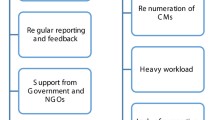Abstract
For all ages all over India, the traditional birth attendant (TBA) commonly known as ‘dai’ has been playing a significant role in providing maternal and child health (MCH) services. It is estimated that there are over 6 million dais in India who attend to about 80 percent of all births (1, 2). In rural as well as in urban and semi- urban areas, people depend on them for MCH services. Although more and more health staff has been added and posted in rural areas, the dai has remained indispensable and conducts most of the deliveries even in places where lady physicians and other female health staff had been posted. Besides the traditional dai, elderly women of the house are also capable of conducting delivery. In remote villages of South India and among nomads, it is quite common to see female members and neighbors conduct the deliveries (3, 4). The traditional birth practices are dependent on the attitude and practices of the dai and hence it would be worthwhile to describe them.
Access this chapter
Tax calculation will be finalised at checkout
Purchases are for personal use only
Preview
Unable to display preview. Download preview PDF.
Similar content being viewed by others
References
Department of Family Welfare in India and the United Nations Fund for Population Activities (1979): Training of dais (TBAs) project agreement. UNFPA (Ind/78/702), New York, 6 pages.
Karthiyani PK (1980): Ministry of Health and Family Welfare, India. Population Reports, Series J, 22, Johns Hopkins University Press, Baltimore.
Brey KH (1971): The missing midwife. Why a training program failed. South Asia Review, 5: 41–52.
Taylor CE (1980): Personal communications. Population Reports, Series J, 22, Johns Hopkins University, Baltimore.
Mathur HN (1979): Analytical study of maternal mortality. IV Annual Conference of Rajasthan Gynaecological Societies.
Desk Officer, Department of Family Planning (1977): Letter No. 0.130, 11/1/76, New Delhi.
Author information
Authors and Affiliations
Editor information
Editors and Affiliations
Rights and permissions
Copyright information
© 1983 Plenum Press, New York
About this chapter
Cite this chapter
Mathur, H.N., Sharma, P.N., Tain, T.P. (1983). Traditional Way of Maternal and Child Health Care in Rajasthan, India. In: del Mundo, F., Ines-Cuyegkeng, E., Aviado, D.M. (eds) Primary Maternal and Neonatal Health. Springer, Boston, MA. https://doi.org/10.1007/978-1-4613-3608-2_41
Download citation
DOI: https://doi.org/10.1007/978-1-4613-3608-2_41
Publisher Name: Springer, Boston, MA
Print ISBN: 978-1-4613-3610-5
Online ISBN: 978-1-4613-3608-2
eBook Packages: Springer Book Archive




